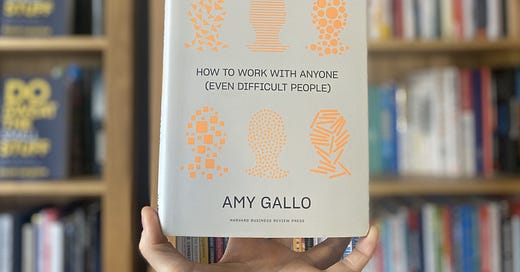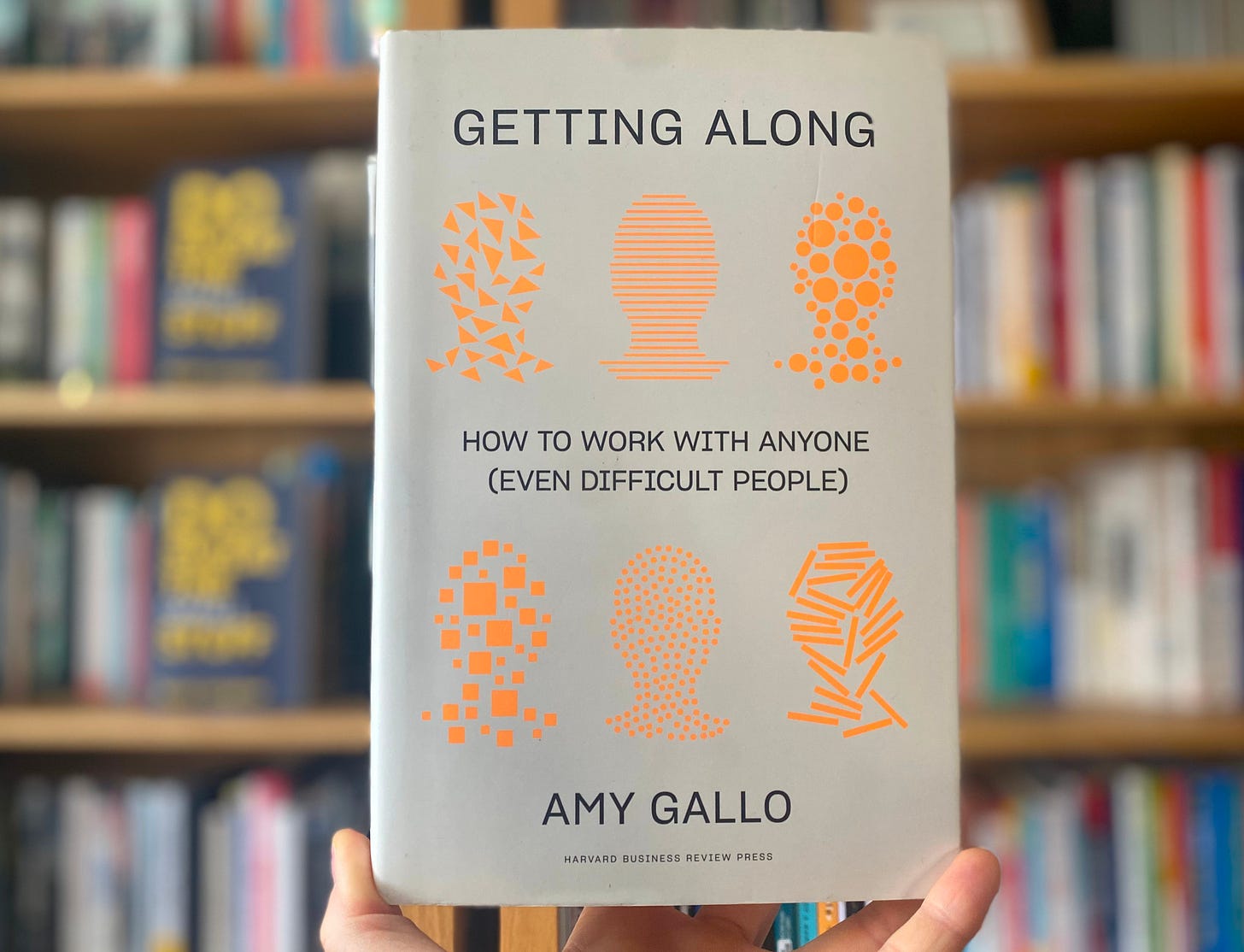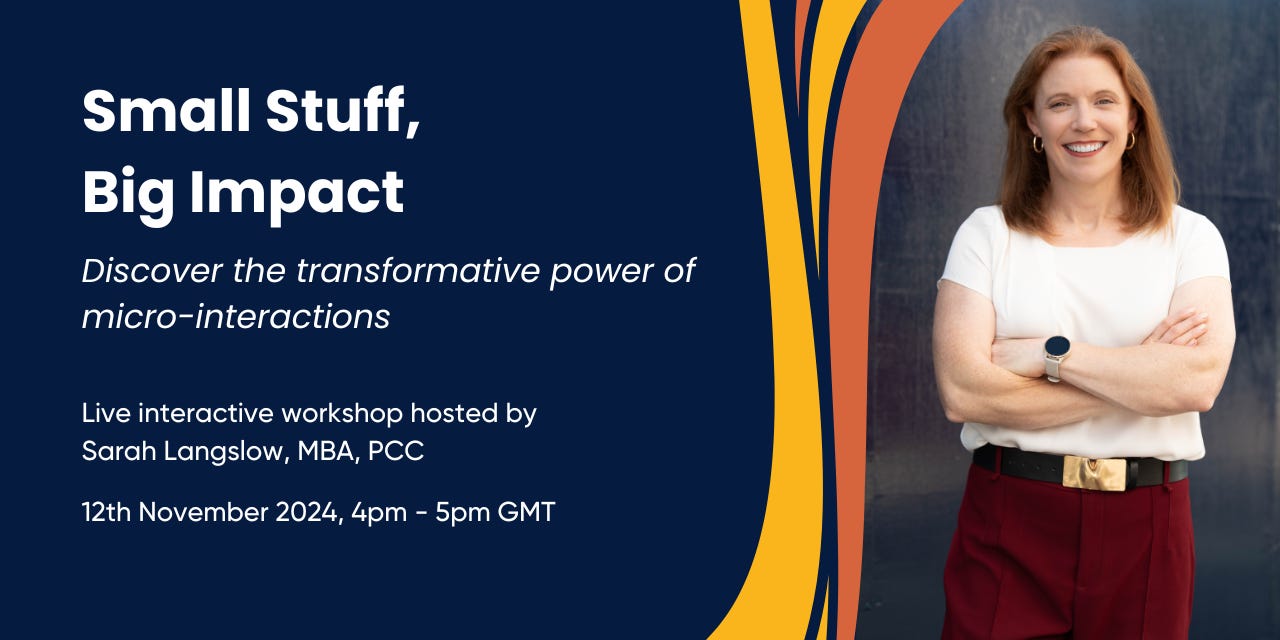How to work with anyone (even difficult people)
This week in what I’ve been reading: Getting Along, by Amy Gallo
Most of us, at one time or another, have to work with people we don’t get on with. Yet with our relationships being crucial to our success and happiness at work, we have to figure out a way to get along – and that’s what Getting Along: How to Work with Anyone (Even Difficult People) will help you do. If you can get past the slightly clunky generalisations in Gallo’s eight archetypes, you’ll discover a book full of practical, pragmatic ideas for handling and working with some difficult behaviours in other people.
What’s it all about then?
While it would be lovely if we got along with everyone, we live in the real world:
“The ugly truth is that there are people in every workplace – many of whom have earned respect and positions of power – who behave in ways that are thoughtless, ambiguous, irrational and sometimes even downright malicious.”
This isn’t to say we shouldn’t put effort in to mend dysfunctional relationships – we should – and that won’t always work. In those situations, we still have to be able to work effectively with people, while protecting ourselves and our own interests at the same time. This is where Getting Along comes in.
Gallo outlines eight archetypes, each representing a commonly encountered type of difficult person:
The Insecure Boss – “I’m great at my job…right?”
The Pessimist – “This will never work.”
The Victim – “Why does this always happen to me?”
The Passive-Aggressive Peer – “Fine. Whatever.”
The Know-It-All – “Well, actually…”
The Tormentor – “I suffered and you should too.”
The Biased Coworker – “Why are you so sensitive?”
The Political Operator – “If you aren’t moving up, you’re falling behind.”
Importantly, she acknowledges the inherent oversimplification of this approach. Many people will display more than one of these characteristics, and most likely they won’t behave like this all of the time. Yet the archetypes still have value as a way to identify different problematic behaviours and then provide an approach for dealing with them.
Each archetype works through a common structure, first describing how to identify the archetype then exploring what drives the behaviour. Next the book explores questions to ask yourself: a necessary acknowledgement that even for difficult people, there are two in any relationship and our own beliefs or behaviours may be a part of the problem. Understanding that can often be the first step to working with difficult people. By acknowledging our own triggers or even ways we are unintentionally making the behaviour worse, we have options that are entirely within our own gift to improve the situation.
Finally for each archetype Gallo lays out a series of tactics to try, and a set of sample phrases to use, as well as what to avoid which could make things worse. The suggestions are offered menu-style, because there is no single right way, nor any method that is guaranteed to be effective. By providing a range of options for you to try, depending on what you are comfortable and able to do and on their behaviour, the book acknowledges the inherent complexity while still offering helpful advice.
The final section of the book addresses two further areas. Firstly, a set of nine general principles for getting along with anyone, whether they fit one of the archetypes, or any other form of conflict or disagreement. While these are pretty obvious, they are also easy to forget in the heat of a difficult encounter, so their simplicity is also their strength.
Lastly Getting Along explores how to protect yourself. Sometimes even the best tactics don’t work, someone is simply toxic and impossible to deal with. In those situations, knowing how to set boundaries, document the behaviour so as to escalate it, and also knowing when it might be time to quit are all important considerations. There are also sensible reminders on self-care, including finding ways to vent productively, cultivate interpersonal resilience, practise self-compassion and refocus on life outside work.
What are the highlights?
This is a book that offers real, specific, practical suggestions. Sometimes “self-help” books like this don’t go quite far enough, describing concepts but not providing enough information for the reader to understand what that might look like in practice. This book is not that, and I appreciated the clarity, the detail and the specificity of the suggestions, right down to what you might say within a conversation.
I also valued the opportunity for self-reflection. In difficult relationships it can be easy to put the blame “over there” with the other person without also looking at how we might also be partly responsible. This is about taking ownership of our triggers and building awareness of our own impact – a subject close to my heart in Do Sweat the Small Stuff.
Anything you didn’t like?
While using archetypes can be helpful for distinguishing different behaviours, I’m wary of applying labels to people. Gallo does acknowledge that it is rare that anyone fits neatly into these categories, and there are usually shades of grey. But labels can also be problematic because they imply something that is fixed and unchanging, rather than something that could be more transient or that we should seek to change, and this isn’t sufficiently addressed in the book.
I also felt a frustration that the book is mostly dealing with the symptoms and not the cause. In effect, how do I work around difficult people while tolerating their difficult, and in many cases frankly unacceptable, behaviour?
I’m torn on this point. I’m realistic enough to understand that in reality we may have to do this, so it does have value. However it sat somewhat uncomfortably in feeling like it always painted the reader as a victim, without agency to seek more fundamental change. I suspect it relates back to my own frustration at quite how frequently toxic behaviour is still tolerated, and in many cases rewarded, in so many workplaces.
Why should I read it?
If you’d like to brush up on some tactics for dealing with challenging behaviour at work, you’ll find plenty of practical support and suggestions. You may discover a lot more compassion through understanding more about the roots of some challenging behaviour, and through that, be in a better place to address it. It might even help you increase awareness of some of your own behaviours and their impact on others…. #justsaying
Above all, difficult relationships that play on our mind take up huge amounts of emotional and mental headspace. Implementing some of the ideas in this book might not solve the issue, but they will help you spend a whole lot less time stewing about it.
“Ideally, with the advice in this book, you’ll be able to turn a colleague who has felt like a thorn in your side into a collaborator and perhaps even a friend. But the more realistic goal is simply to shift the dynamic – improve it – so that it causes you less strife and you have the energy to do your best work.”
Getting Along: How To Work With Anyone (Even Difficult People)
By Amy Gallo. Published by Harvard Business Review Press in 2022.
Available at Amazon UK, Amazon US, or Bookshop.org. (#aff links)
Have you read Getting Along? I’d love to hear what you thought, so click here to add a comment or your own review:
Your leadership says more than you think…
I recently joined Corine Hynes on the Visible Leader podcast for a facinating conversation about the gap between our intention and our impact.
We explored the unintended consequences of being too nice when giving feedback, how to see and account for the impact of power dynamics – including how they make things go a bit wacky – and how bringing more thought and patience to our responses is key to creating the alignment between intent and impact.
It was a fun conversation! If you’d like to have a listen, you can find it on Apple Podcasts or on Spotify.
It’s back!
If you missed the last one, it’s back! I’m running another – updated and improved – Small Stuff Big Impact Workshop on 12th November at 4pm GMT.
Unlock the hidden power of small, everyday interactions with "Small Stuff, Big Impact: Discover the transformative power of micro-interactions" – this live, online (and complimentary) workshop will introduce you to the world of micro-interactions – those small, seemingly inconsequantial moments that have a profound impact on your team’s engagement and performance. If you’re leading or managing others, mastering these moments is essential to building stronger relationships and creating a more motivated, connected team.
In this 60-minute introductory workshop, you will:
🌟 Learn what micro-interactions are and why they matter in leadership.
🌟 Discover how small adjustments in communication, tone, and behaviour can create a ripple effect, transforming your daily interactions into powerful tools for engagement.
🌟 Learn how to translate theory into action – you will leave with practical suggestions to start making subtle but effective changes right away.
Register for your place via this link, and please do share with anyone you know who might like to join.
Places are limited to ensure a truly interactive discussion, so sign up now to avoid missing out.
See you there!
If you know someone else who might enjoy this, click here to send it to them directly:
Thank you!





